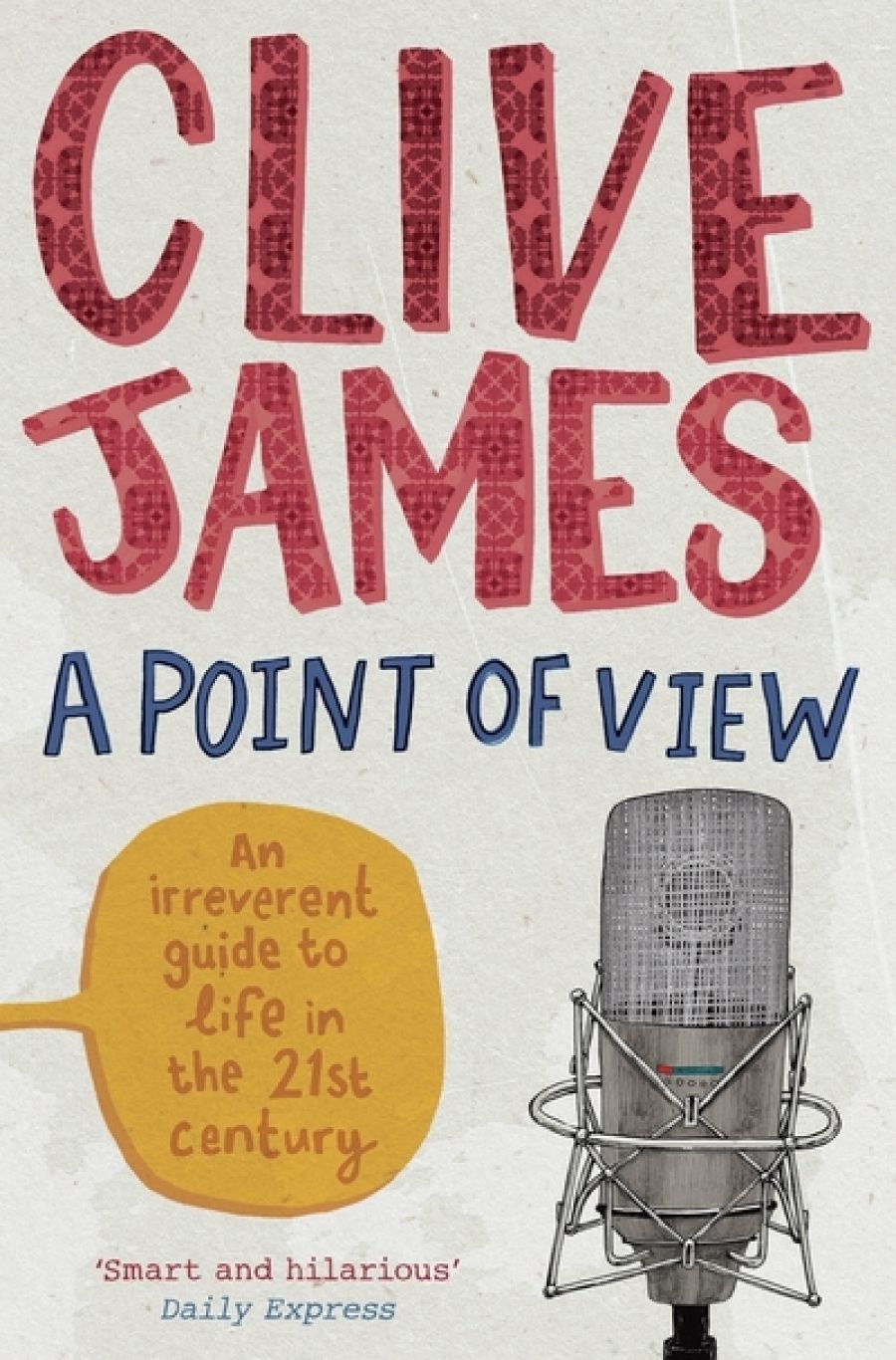
- Free Article: No
- Contents Category: Anthology
- Review Article: Yes
- Online Only: No
- Custom Highlight Text:
A Point of View is a weekly BBC Radio series in which invited speakers deliver ten-minute talks about ‘anything that has captured their imagination’ that week. Clive James contributed from 2007 to the end of 2009. This book is a collection of his talks. It is fascinating to read, both because of the immense range of subjects he covered and because it gives you some insights into the author himself.
- Book 1 Title: A Point of View
- Book 1 Biblio: Picador, $32.99 pb, 358 pp
Radio talks have a long and honourable history in public broadcasting. Done well, they are a joy, because they are unmediated. No interviewers, no journalists badgering and trying to control the flow. Instead, personal and usually coherent explorations of interesting ideas, in which the speaker’s mind is what matters. Radio is perfect for this, being both intimate and still. The audience is, literally, all ears. The real art is to sound like an old friend who has been away and has now dropped in to catch up. For real success, the communication between speaker and listener ought to be as between equals.
Clive James’s contribution to the series amounted to sixty talks originally broadcast between three and five years ago. They make a timely reminder of his formidable energy for wrangling ideas. He wrote each talk and describes the process as ‘the devil of a job, if only because you couldn’t afford for it to sound like that. It had to sound like speech’. In other words, these pieces were not primarily intended to be read but to be heard. And there’s the rub.
James’s public persona is known to most Australians. Famously kaleidoscopic, his mind’s constantly shifting patterns and sequences, when translated to speech, riffle through ideas and references at lightning speed. That very speed and riffle in his delivery act effectively to bundle the listener across any awkward bits in the text. In this case, as he puts it, ‘The aim was to treat the contemporary talking point while covering the history of the globe in the volume of an orange.’
Reading talks or listening to them, you quickly detect that, rather than intimate one-on-one delivery, he is performing as if to a large audience. His point of reference is always himself, not he and the listeners. It is a style to keep himself in the foreground, racing ahead of the listeners. As is the self-deprecation and, of course, that gorgeous humour. Aurally dazzled, the radio listener isn’t given enough time to decipher what is glitter and what is really gold. All she or he can do is to sit back sighing, ‘God, he’s amazing.’
But the written version does help you decipher what is what. The reader has the opportunity to spend much longer with the text than the listener. In print you certainly find the originality and the wit, the bevy of beautiful phrases, and the balletic leaps from one reference to another. But you also discover how sometimes the wit can slip into unwarranted mockery or denigration. It may not sound that way on the radio, but it does read that way. You will also spot how some subjects are unadorned with fresh insight, and how some are dealt with smugly; how climate change is treated as a running joke (its advocates infuriate him); how the Iraq War was a good thing; and how many of his comments on women can read very oddly. But there are benefits, too: for example, you can at last work out how he managed to get from A to Z and back in just ten minutes. The BBC’s website still has the talks online, so seize the opportunity to compare text and sound for yourself.
Covering such a wide range, it is not surprising that some of the talks are better than others; some more deeply felt; some touching a real public pulse. But, as the back cover states, the series is ‘essentially a chronicle of life in twenty-first century Britain’. Which is, of course, a dream run for Clive James, whose own published memoirs so far extend to five volumes. Clearly a man not afraid to chronicle!
The book begins with a talk on pollution and finishes with one on generations and democracy. In between, you visit many countries and many different issues: a journey made memorable by your laughter on the way through. ‘Clams are Happy’, ‘Princes into Battle’, and ‘Private Life’ are fine examples of James in full and insightful form, as are ‘Jesus’ and ‘Right on the Money’. There are many more like them.
Then, a second level of pieces, less thought-provoking but still very engaging. Finally, a number that are, for this reader, not worth the detour. ‘The Speeding Judge’ and ‘High-Priced Porn’ (broadcast on consecutive weeks), for example, are weak and uncomfortably smug. Quite why James felt the need to share the misfortunes of Marcus Einfeld with the British, when he had nothing to add to the known facts, is perplexing.
But that’s the man, mostly engaging, sometimes exasperating: this book is really a portrait of himself. Be sure to read the talk called ‘Sheer Poetry’, then turn to his website and listen to his radio series with Peter Porter. Not performances, these are a splendid feast of real conversation, with both men at their best on a subject they love. You will, too.


Comments powered by CComment